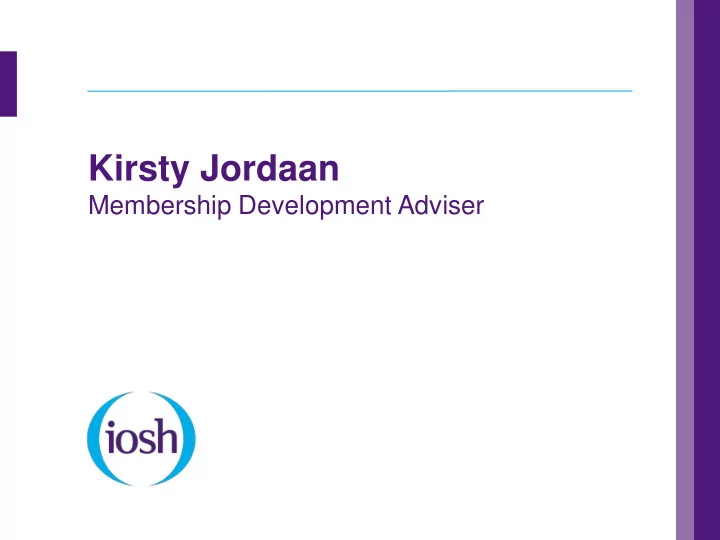

Kirsty Jordaan Membership Development Adviser
CPD and IPD made clear
CPD Presentation
What is CPD Continuing Professional Development - Continuing Professional Development (CPD) helps you create a structured career path, as well as safeguarding your professional status. - It’s about improving your skills, knowledge and expertise by carrying out development activities - After carrying out these activities, you reflect on what you’ve gained or achieved. - While CPD is open to all categories of IOSH Membership, Technical Members, Graduate Members, Chartered Members and Chartered Fellows are bound by the IOSH Code of Conduct to carry out CPD.
Value of CPD to Members - Helps to highlight gaps in your knowledge, skills and experience. - Builds confidence and credibility- you can track your learning and progress. - Creates a professional impression at appraisals and job interviews. - Helps you maximise your earning potential. - Shows your employer that you are maintaining your skills.
Benefits of CPD to organisations - Maximises staff potential by linking learning to actions and theory to practice. - Helps HR professionals to set specific, measurable. Achievable, realistic and time-bound objectives. - Promotes better staff morale and motivates the workforce. - Portrays a positive image/brand to other organisations. - Helps employees focus on individual achievements throughout the year.
How to maintain a successful CPD record
Your development plan - Should be reviewed and updated on a regular basis - It should be include an overview of the following - 1. Duties and responsibilities (job description) - 2. Objectives (for the next 6-12 months) - 3. Personal development (strengths, weaknesses, area for improvement)
Activity Reflective statements - What- what the activity was. - Why- you decided to carry it out. - What- you gained from the activity. - How- you will use or apply the knowledge you gained in the future.
CPD- Recent changes - No longer operates in three-year cycles - Points/credits are no longer part of the CPD assessment criteria. - Points/Credits have been removed. - To save your development plan and activities, simply click a tick box (A, B, C, D). - A – (to save your development plan) - B,C,D (to save your activities). - CPD Assessment criteria focuses on the strength and content of your reflective statements.
Adopt a structured approach to your CPD - The most common answer given by members for not completing CPD is “I don’t have enough time” - Develop an annual CPD planner - Record your activities - Divide your working year into quarters. - Set aside 40 minutes at the end of each quarter to upload your CPD activities onto the microsite. - Review Record Reflect.
IPD Presentation
How does IPD Work Initial Professional Development - Member is transferred to Graduate status - Member enrols for IPD and pays £160 fee - IPD activated - Member has up to 2 years to complete the assessment process. - Skills Development Portfolio (SDP)/ Or and the Electronic Open assessment exam (EOA) - CPD audit - Peer Review Interview - The process you complete through the IPD process will depend on the qualification you have completed to become a Graduate member
Who can do it? - Only Graduate members are eligible - IPD is not compulsory like CPD, but is a requirement for progress to Chartered status. - A member can re-register if they do not complete IPD within the two year time period.
Skills Development Portfolio - Evidence- based assessment process similar to an NVQ - Produced online via MYIOSH-MYIPD - Members choose seven criteria from the five elements - Members upload evidence of their work electronically - System will provide guidance on minimum requirements - Evidence can go back up to two years.
Skills Development Portfolio - Each criterion requires: - An outline or summary of proposed work and intended outcomes - An activity log - Indexed evidence - A reflective account - Criteria can be submitted individually - Two to three weeks for assessment.
Electronic Open assessment exam (EOA) - You must register for the exam date you require - The EOA runs each month, part from the following months; - April - June - December - The exam period is 14 days – you will have 7 days to complete the exam - Two parts to the exam - Part A – 38 multiple choice questions marked online, 3 hours to complete the exam - Part B – two scenario-based questions 700 word count on each question marked by an examiner
Electronic Open assessment exam (EOA) - If you pass Part A you can attempt Part B - If you fail Part A, you must re-register and try Part A again - If you fail Part B, you must re-register but you do not have to re-take Part A again - Maximum of four attempts will be allowed
Peer Review Interview - Final part of the IPD assessment process - Scheduled at various locations - Video conference option for overseas members - £80 fee for Grange; £95 for external venue - PowerPoint presentation – 10 minutes.
Preparation for the interview - Provide presentation and record of employment - Ensure you know the 4 keys area’s of the IOSH Code of conduct - Be aware of the importance of your CPD - Remember this is your interview…I NOT we - Core questions are not available before the interview - No notes are permitted during the interview
Peer Review Interview - Interviewed by a panel of CMIOSH/CFIOSH volunteers - Interview lasts 45-60 minutes - Outcome within 21 days - If successful, transferred to CMIOSH - If unsuccessful, feedback provided and re-interview required.
Thank you Contact the Membership Team: 0116 2573198 membership@iosh.co.uk
Recommend
More recommend